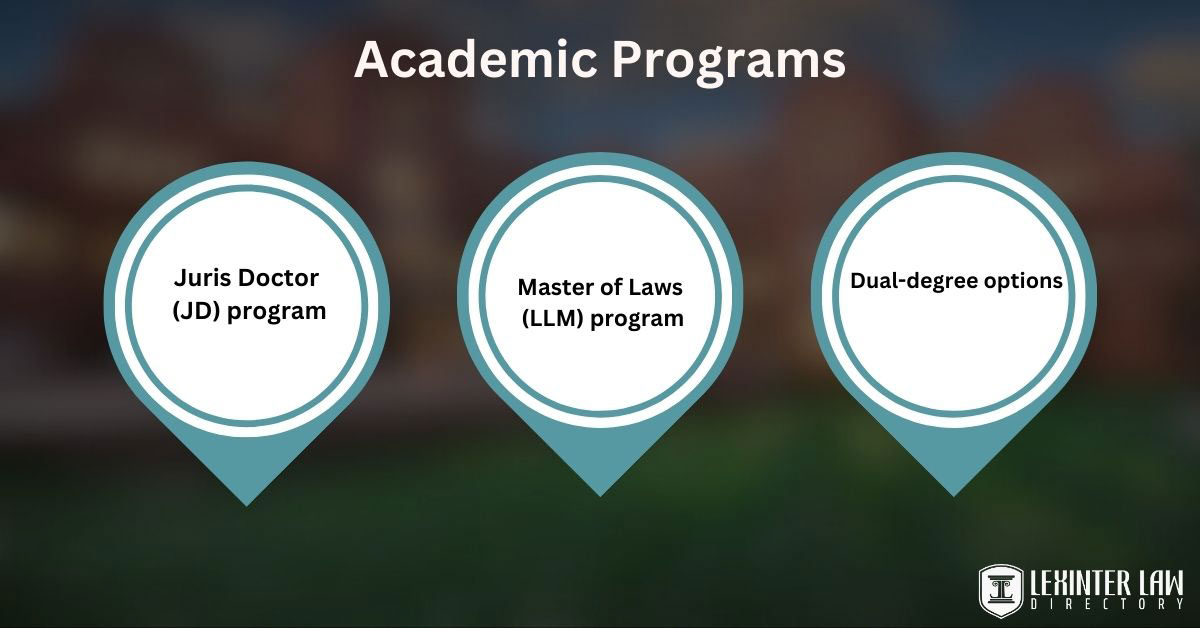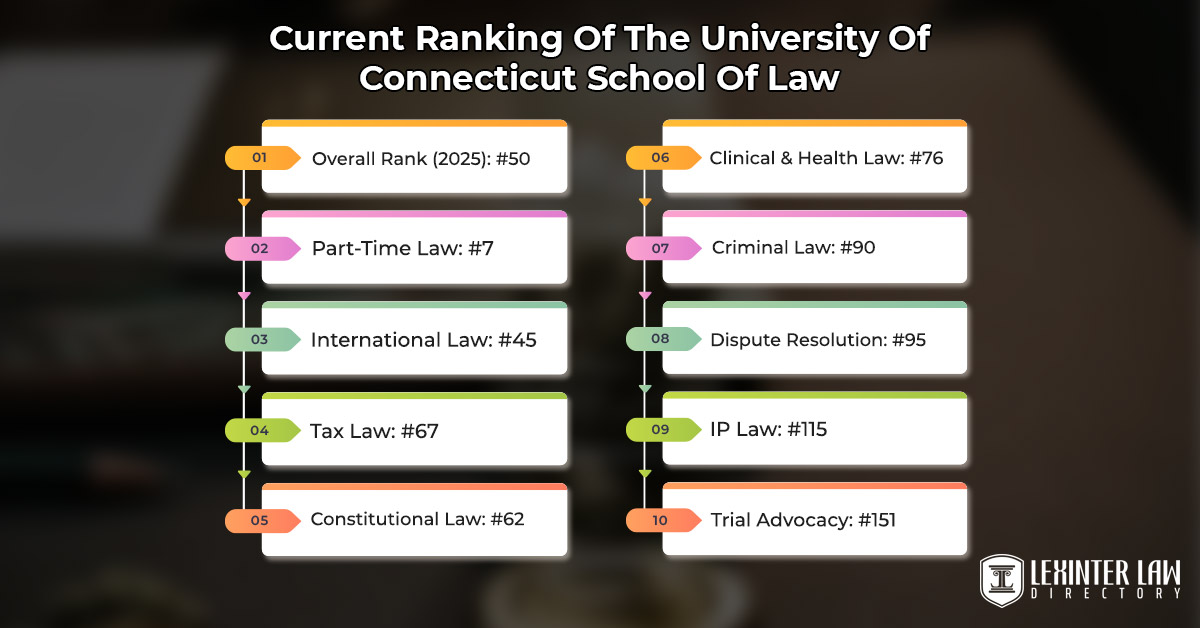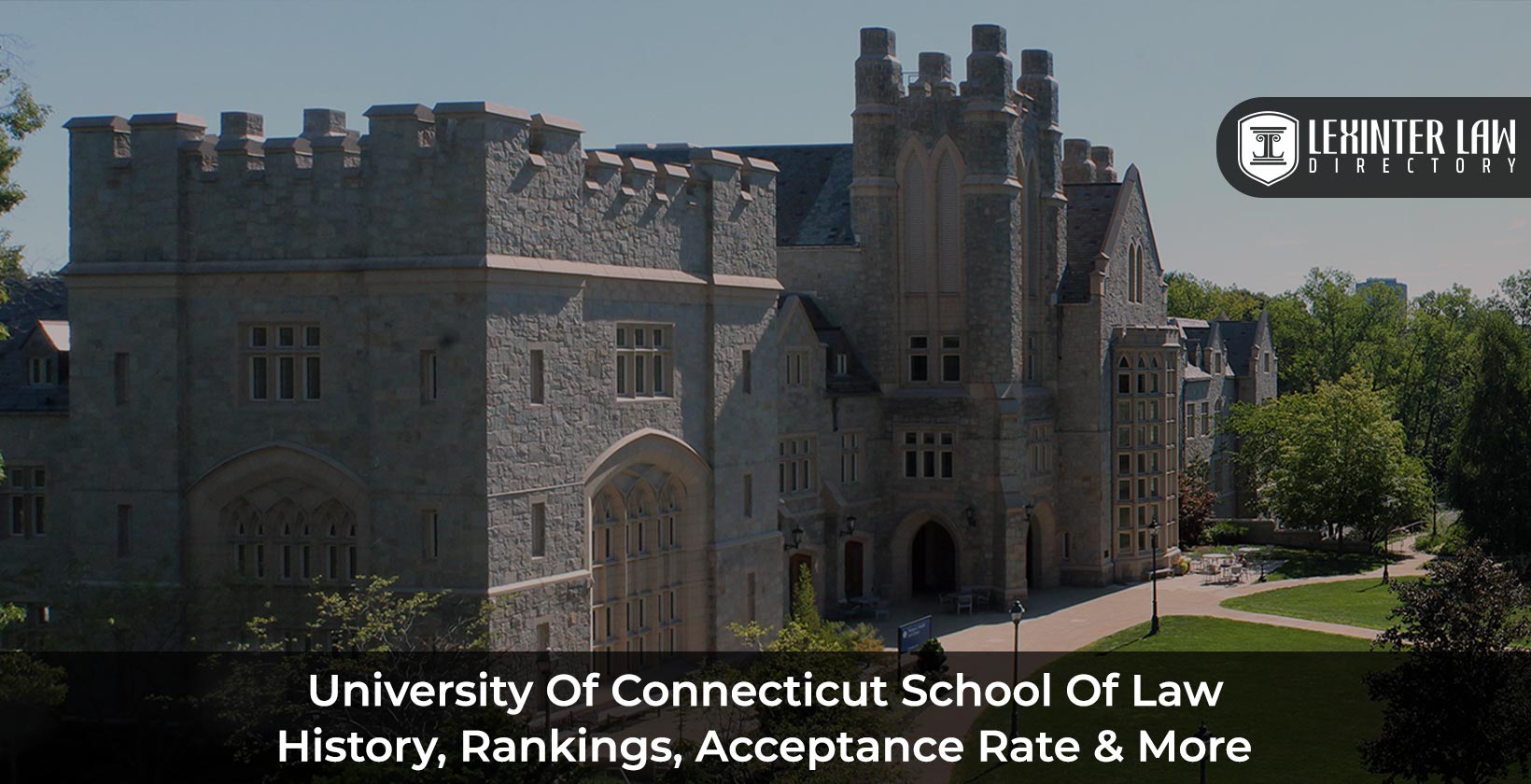University Of Connecticut School Of Law – History, Rankings, Acceptance Rate & More
The University of Connecticut School of Law, situated in Hartford, provides a distinguished legal education founded on academic excellence and practical training. Known for its Collegiate Gothic campus and strong faculty, UConn Law offers a range of degree programs, including the JD, LLM, and SJD, as well as specialized certificate and dual degree options.
With competitive admissions standards, a low student-faculty ratio, and a strong Bar passage rate, UConn Law attracts students seeking rigorous legal preparation. Its strategic location in Connecticut’s capital provides access to courts, law firms, and public agencies, enriching student experiences through internships, clinics, and professional development opportunities.
Table of Contents
Historical Background
Founding And Establishment Of The University Of Connecticut School Of Law
UConn School of Law began its journey in 1921 when George and Caroline Lillard established the Hartford College of Law. Designed as a night school, it targeted Hartford’s working professionals, particularly in the insurance and business sectors, who sought legal education while maintaining full-time employment. Classes operated in rented facilities within downtown Hartford, offering accessibility and flexibility. By 1933, the school earned accreditation from the American Bar Association, as well as approval from the Connecticut Bar Association’s Examining Committee, reflecting its academic credibility and rigorous standards.
A pivotal transition occurred in 1943 when the University of Connecticut assumed administrative responsibilities, marking the school’s formal alignment with a broader public institution. This shift laid the groundwork for greater resources and institutional integration. By 1948, the law school had been fully integrated into the university’s structure, solidifying its identity as the UConn School of Law. The foundation period set a clear precedent for accessible, practice-oriented legal education within a dynamic institutional framework.
Location And Campus
Address And Geographical Location
The University of Connecticut School of Law is located at 55 Elizabeth Street, Hartford, CT 06105. For events hosted in William F. Starr Hall, the preferred GPS address is 110 Sherman Street, Hartford, CT 06105. The campus lies within the historic West End neighborhood of Hartford, the capital city of Connecticut. Positioned just 25 miles west of the main University of Connecticut campus in Storrs, the law school benefits from close proximity to significant state institutions.
Hartford houses the Connecticut State Legislature, the Connecticut Supreme Court, and the headquarters of major insurance companies and corporations, offering a rich legal and professional environment. The urban placement of the UConn School of Law enables students to access a wide array of internships, externships, and employment opportunities within walking distance of the campus.
Description Of The Campus Facilities And Amenities
With modern libraries, comfortable study rooms, and a diverse range of food options, the campus is a haven for students. These facilities contribute to a productive and enjoyable student experience, allowing learners to thrive in a supportive community.
The UConn School of Law is situated on a 17-acre campus, distinguished by its Collegiate Gothic architecture and its designation as a National Register of Historic Places site. The campus comprises five interconnected granite buildings situated around a central quadrangle. This quadrangle features the “Middle Path,” a U-shaped sculpture by Robert Sindorf. Cheryl A.
Chase Hall contains the dean’s office, administrative departments, and the two largest lecture rooms on campus. William F. Starr Hall serves as a central venue for academic and ceremonial events, featuring an expansive Reading Room that houses student journal offices and classrooms. Hosmer Hall includes faculty offices, the Insurance Law Center, and the Janet M. Blumberg Hall, which supports a range of events.
Knight Hall provides classroom space, a student lounge, and a fitness center, enhancing student life and wellness. The Thomas J. Meskill Law Library stands as a five-story facility offering extensive legal resources, multiple study areas, instructional spaces, a café, and group collaboration rooms. The library and surrounding campus grounds remain open to the public during designated hours.
Academic Programs

Juris Doctor (JD) Program
The Juris Doctor at the University of Connecticut School of Law forms the core of its legal education offerings. Structured to accommodate different schedules, it exists in two formats: the full-time Day Division and the part-time Evening Division. The program delivers a comprehensive foundation in legal theory and practice, preparing students to sit for the Bar examination and pursue various legal professions. Customization is achieved through a broad selection of elective courses, experiential learning clinics, and focused certificate tracks.
UConn School of Law enhances the JD academic experience through eight certificate programs. These include Corporate and Regulatory Compliance, Energy and Environmental Law, Human Rights, Insurance Law and Regulation, Intellectual Property, Law and Public Policy, Tax Studies, and Transactional Practice. Each certificate program provides in-depth academic and practical training tailored to specific legal sectors, allowing JD students to align coursework with professional goals.
Master Of Laws (LLM) Program
The Master of Laws program addresses the needs of both domestic and international legal professionals seeking advanced specialization. UConn Law offers six distinct LLM concentrations: U.S. Legal Studies, Insurance Law, Human Rights and Social Justice, Energy and Environmental Law, Governance, Risk Management, and Compliance, and Intellectual Property and Information Governance. Each program delivers intensive instruction tailored to complex, evolving legal fields, supported by a faculty engaged in both scholarship and applied practice.
In addition to these core tracks, LLM candidates can choose further concentrations such as Intellectual Property, Human Rights, Tax Studies, Foundations of U.S. Law, U.S. Civil and Criminal Justice, Business Law and Regulation, and U.S. Law of Property Transfer. These specialized academic paths deepen legal understanding and enhance alignment with global and domestic career opportunities.
Dual Degree Programs
UConn Law enables interdisciplinary study through several dual degree tracks. These include JD/LLM, JD/Master of Business Administration, JD/Master of Public Administration, JD/Master of Public Health, JD/Master of Public Policy, and JD/Master of Social Work. Each program supports a cross-disciplinary approach, allowing students to blend legal training with expertise in business, public service, health policy, and social work.
Distinguished Faculty
Distinguished Full-Time Faculty
The University of Connecticut School of Law boasts a distinguished faculty recognized for their scholarly excellence and dedication to advancing legal education. Faculty members combine academic depth with real-world experience, covering a broad array of legal disciplines such as tax law, constitutional law, human rights, and intellectual property. Their scholarship consistently shapes contemporary legal discourse while enriching classroom instruction.
Richard Pomp, the Alva P. Loiselle Professor of Law and Board of Trustees Distinguished Professor, stands as a global authority in tax law. His advisory work with multiple U.S. states, the International Monetary Fund, and the World Bank has significantly influenced tax policy worldwide. Anne C. Dailey, the Ellen Ash Peters Professor of Law and Associate Dean for Faculty Development, is widely regarded for her scholarship in constitutional law and legal theory. She received the university’s Board of Trustees Distinguished Professor title in 2025, a recognition of her academic leadership.
Influential Scholars In Specialized Fields
Steven Wilf, Anthony J. Smits Professor of Global Commerce, brings an interdisciplinary approach to intellectual property law and legal history. His scholarship examines the origins and evolution of legal systems, while also contextualizing the development of intellectual property rights. Robert L. Birmingham has made lasting contributions to contract law through his theory of efficient breach, a concept that integrates economic reasoning with legal frameworks.
Loftus Becker, Professor Emeritus, is well known for his legacy in criminal and constitutional law. His early legal career included clerking for Justice William J. Brennan Jr. of the U.S. Supreme Court. His decades of teaching shaped multiple generations of legal minds. Timothy Fisher, who served as the 17th dean of UConn Law from 2013 to 2020, launched pivotal initiatives to strengthen clinical programs and advance legal access. He remains actively engaged in public interest work and legal reform.
Breadth Of Expertise And Interdisciplinary Strength
The faculty at UConn Law hold advanced degrees in complementary disciplines such as philosophy, anthropology, and economics. This academic breadth supports an interdisciplinary teaching style that reflects the complexity of modern legal issues. The faculty’s subject matter expertise spans areas including business and commercial law, health law, criminal law and policing, tax law, international law and human rights, insurance law, constitutional law, and intellectual property law.
Their deep commitment to experiential learning is evident in the school’s robust clinical offerings. Through legal clinics and community partnerships, students engage in hands-on legal work under faculty guidance, reinforcing the practical application of doctrinal knowledge..
Ranking And Reputation
Current Ranking Of The University Of Connecticut School Of Law

The University of Connecticut School of Law holds the #50 position in Best Law Schools and ranks #7 in Part-time Law according to national rankings. In specialty areas, it demonstrates strong performance in International Law (#45), Tax Law (#67), and Constitutional Law (#62). Its standing in Business/Corporate Law (#62), Clinical Training (#76), and Health Care Law (#76) reflects a solid academic reputation. UConn Law also features in Criminal Law (#90), Dispute Resolution (#95), and Intellectual Property Law (#115). While Trial Advocacy ranks at #151, the school maintains a diverse and competitive profile across multiple legal disciplines. They work hard to have students from different backgrounds. It’s part of what makes the University of Connecticut law school ranking so high.
Selective Admissions
Acceptance Rate And Enrollment (2025)
In 2025, UConn Law reported an acceptance rate of 30.2%, highlighting its status as a selective institution. From approximately 1487 applicants, a fraction were admitted, resulting in a total enrollment of 471 law students. Among the enrolled class, 89.4% were Connecticut residents, reinforcing the school’s regional draw and commitment to serving the state’s legal education needs.
LSAT And GPA Statistics (2025)
The University of Connecticut School of Law maintained competitive academic standards for the 2025 entering class. LSAT scores ranged from 158 to 163, with a median score of 161. Undergraduate GPAs fell between 3.5 and 3.87, with a median GPA of 3.72. These numbers reflect the academic strength of the 2025 cohort and the school’s selective admissions process.
Bar Passage, Employment, And Cost Overview
Bar Passage Performance
UConn School of Law demonstrates a solid Bar passage record. The first-time Bar passage rate is 81%, outperforming the average of 71.4% among reporting jurisdictions. The school also holds a two-year ultimate Bar passage rate of 92.5%, indicating consistent long-term exam success among its graduates across multiple attempts.
Employment Outcomes
UConn Law reports strong employment metrics, with 93% of graduates achieving full-credit outcomes within 10 months after graduation. Approximately 79% are employed at the time of graduation. These figures show effective career services support and graduate placement, especially within legal sectors in Connecticut and the surrounding region.
Tuition And Cost Of Attendance
At the University of Connecticut School of Law, in-state tuition for full-time students is $31,508, while out-of-state students pay $62,550. Additional expenses include $16,902 for food and housing and $1,800 for books. The average indebtedness for 2024 J.D. graduates who borrowed stands at $93,710, with 70% taking on student loans. The school does not currently offer a loan repayment assistance program.
Frequently Asked Questions About UConn Law School
1. What LSAT Score Do I Need For UConn Law?
You need an LSAT score between 158 and 163 to be competitive for UConn Law, with the median score for the 2025 entering class at 161. Targeting this range strengthens your chances in the selective admissions process.
2. What GPA Do You Need For UConn Law School?
You need a GPA between 3.5 and 3.87 to be competitive for UConn Law School, with the median GPA for the 2025 entering class at 3.72. Meeting these admission criteria increases your chances of admission in the selective applicant pool.
3. What Is The Acceptance Rate For UConn Law School?
The acceptance rate for the University of Connecticut School of Law in the 2025 admissions cycle is approximately 30.2%, reflecting its competitive admissions process.
Conclusion
The University of Connecticut School of Law stands out for its strong academic standards, competitive admissions, and solid post-graduate outcomes. The law school is considered one of the top law schools in Connecticut. With selective LSAT and GPA ranges, high Bar passage rates, and impressive employment figures, UConn Law offers a rigorous legal education. Its commitment to academic excellence and practical training positions graduates for success across various legal fields and sectors.

